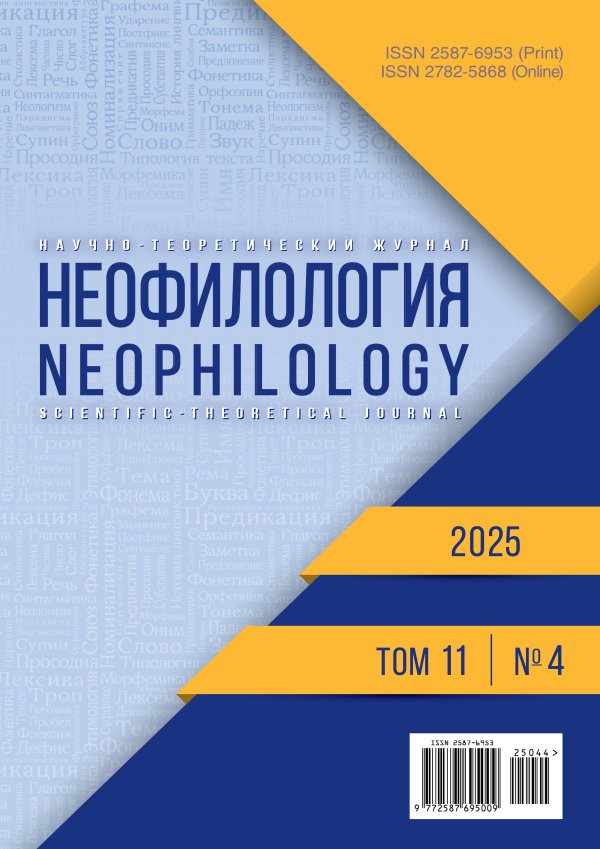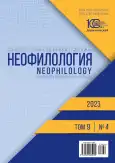Научные взгляды Р.О. Якобсона в парадигме текстолингвистики
- Авторы: Е Л.1, Лю И.1
-
Учреждения:
- Нанкинский педагогический университет
- Выпуск: Том 9, № 4 (2023)
- Страницы: 1017-1025
- Раздел: ТЕОРИЯ И ИСТОРИЯ КУЛЬТУРЫ
- URL: https://journal-vniispk.ru/2587-6953/article/view/295797
- DOI: https://doi.org/10.20310/2587-6953-2023-9-4-1017-1025
- ID: 295797
Цитировать
Полный текст
Аннотация
Изучена семиотическая концепция Р.О Якобсона, идеи которой связаны со структурализмом как методом познания, семиотикой как науки о знаковых системах и поэтикой как общей семиотикой текста. Проанализированы основные компоненты концепции Р.О. Якобсона, основанные на лингвокультурологическом аспекте текстологии. Обобщены его комплексный и диалогический взгляд на семиотику, уникальные особенности его исследовательской парадигмы. При рассмотрении категории «комплексность» обращается внимание на моделирование модели «смысл – текст» в аспекте сближения науки о языке с науками антропоцентрического цикла. Рассмотрение сходства и смежности метафоры и метонимии позволили Р.О. Якобсону считать, что любая метонимия наделена легкой метафорической тенью, а любая метафора имеет метонимическую окраску, и выделить формальный метод исследования, который представляет собой слияние и преобразование двух различных процессов мышления – гуманистического и научного. Учёный считал языковое сознание в некотором роде производным от этнокультурного сознания, поскольку оно отчётливо отражает представления восточных и западных людей о мире внутри отдельной национально-культурной традиции, выстраивающей свой научный взгляд, определяющей особенности организации дискурса. Категория «диалогичность», проявляющая в процессе речемыслительной деятельности индивида, реализует диалектическое единство языка и мышления, в связи с чем, имея в виду мыслительные процессы, происходящие в сознании человека, корректнее говорить о диалогичности как о текстопорождающем речемыслительном процессе.
Ключевые слова
Об авторах
Линь Е
Нанкинский педагогический университет
Email: yl09034@aliyun.com
ORCID iD: 0000-0002-5973-3925
кандидат филологических наук, преподаватель кафедры русского языка и литературы
210097, Китайская Народная Республика, г. Нанкин, ул. Нинхай-Роуд, 122Итун Лю
Нанкинский педагогический университет
Автор, ответственный за переписку.
Email: 18845796548@163.com
ORCID iD: 0009-0008-3647-2292
аспирант
210097, Китайская Народная Республика, г. Нанкин, ул. Нинхай-Роуд, 122Список литературы
- Эко У. Отсутствующая структура. Введение в семиологию. СПб.: Symposium, 2006. 544 с.
- Гончаренко В.Н. Развитие некоторых научных взглядов Р.О. Якобсона в контексте работ У. Эко // Символ науки: международный научный журнал. 2016. № 2-3 (14). С. 59-63. https://elibrary.ru/xwjgyf
- Волошина О.А. Роман Якобсон «в поисках сущности языка» (к 120-летию со дня рождения) // Русский язык в школе. 2016. № 10. С. 63-69. https://elibrary.ru/xwwmlt
- Jakobson R. Linguistics in relation to Other Sciences // On Language / L. Waugh, M. Monville-Burston eds. Cambridge: Harvard University Press, 1990. Р. 45-488.
- Чжан Х. Стереотипное представление о добром человеке русском языковом сознании // Когнитивные исследования языка. 2023. № 3-2 (54). С. 248-252. https://elibrary.ru/rifpuw
- Jakobson R.O. Language and the unconscious. M.: Gnosis, 1996. 245 p.
- Фан Ханьцюань. Принцип дихотомии и его применение в литературной критике // Иностранный язык и преподавание иностранных языков. 2002. № 7. С. 37-41.
- Ван Цзясин, Ван Шэнчжи, Юань Цзяньвэй. Три темы в современной российской теории риторики. Нанкин: Изд-во Нанкинского университета, 2019. 278 с.
- Ваух Линда, Лю Дань. Диалогический характер сочинений Якобсона как диалог между основами языка и основами научной деятельности // Фронт социальных наук. 2020. № 3. С. 158-169.
- Нагорная А.В. Использование метафор в психотерапевтической практике // Социальные и гуманитарные науки. Отечественная и зарубежная литература. Серия 6. Языкознание. 2021. № 4. С. 97-120. https://doi.org/10.31249/ling/2021.04.04, https://elibrary.ru/mlavyn
Дополнительные файлы










